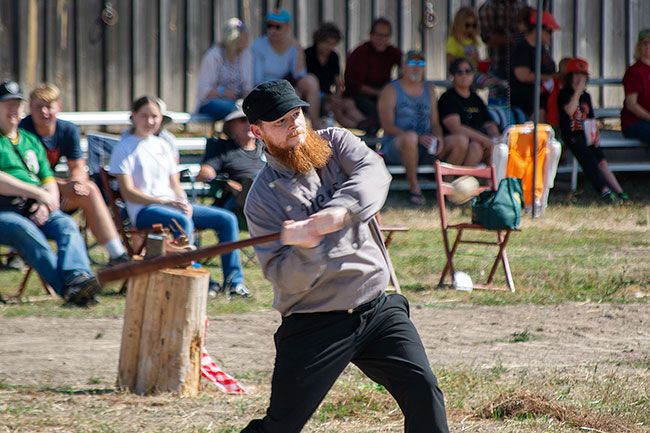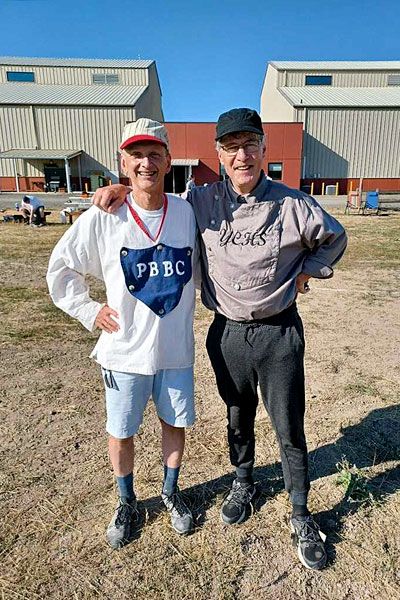Back, and Forth: A day of aces and A’s


The occasion was the annual Vintage Base Ball game against the Portland Pioneers crew, held at the Yamhill Valley Heritage Center, sponsor of both the game and the McMinnville Gristmillers Club.
The game, now in its eighth year, is a program of the Yamhill Valley Heritage Society. I joined the Gristmillers, semi-officially, two years ago, and first played in 2022.
On Sept. 9, the gentlemen from Portland visited McMinnville again, defeating the Gristmillers 18-15 in what was a fine match.
My friend Jim Lund was visiting. He only planned to be a spectator, but filled in well as a striker and first baseman when the Portland club needed an extra player.
I gave Jim a few good cross-diamond jests when he was on the field or scoring an ace.
“Ace” is the 19th century base ball word for run, or score. It’s just one example of the lively differences in terminology and rules between Vintage and the game that most of us grew up learning.
An out is a “hand,” and a player is not out but “dead.” The batter is the “striker” and the pitcher the “hurler.” The umpire is the “arbiter.”
There are no mitts, so catches must be made bare-handed. If you field a ground ball off a single bounce, it’s a “hand.”
You can’t run past first on a simple putout attempt. If you fail to come to a complete stop, you risk being tagged “dead.”
If you do safely cross home plate, the ace doesn’t count unless you ring a cowbell placed nearby on a stump. Home plate is an actual plate and the infield bases, called “bags,” are actual flour sacks.
These details ably handled by Gristmiller manager Dave “Stretch” Rucker.
Even the hits have fun names. A high fly is a cloud scraper, and a ground ball that takes an odd bounce in the dirt is a daisy cutter.
The game amounts to an effort at living history. Accordingly, we made our entrance on a hay wagon pulled by a 1912 Aultman & Taylor steam engine — one the Historical Society has lovingly restored.
In an era when the grand old game has been compromised by massive contracts and egos (not that there were not massive egos in the 1860s) it is rewarding to play in the spirit of the game’s beginnings.
Different rules and terms, along with the cool uniforms provided by the teams, are all part of the fun of the annual game.
In Vintage Base Ball, there are no bases-on-balls. And in case some broken plow piece had been left in the ground, there is no sliding.
In keeping with that, we played on a rough field next to the museum, on cropland that had been harvested three weeks earlier with 19th century equipment.
On one play, Gristmiller Taylor “Ice Man” Maxwell overran first and Jim and the other infielders chased him well into right field. It was a wild and comic pursuit, with our very speedy guy weaving and eluding all tags.
Ice Man was nearly all the way to second before escaping the pickle by hurtling back to first, finishing with an epic head-first slide. But, of course, he was called out, both for sliding and for going way outside the baseline.
Jim told me he kept chasing him “because I thought with all these different rules, maybe it was legal in those days to run all over like that!” For these are rules from 1866, when town teams (and accompanying bands) would travel by wagon and ferry to nearby towns for gentlemanly Saturday games.
It’s a great group of gentlemen I have gotten to know in Vintage Baseball.
We all have team names, mine being Quill. Others were Flip, Dinner Plate, Biscuits, Maverick, Freight Train, Jack Rabbit, Slow Poke and Tin Man, all befitting the era. Even the arbiter had one — Lumpy.
One tradition with the annual Vintage game is to take a fifth-inning stretch, during which one can pose for photos, sign autographs, let the crowd toss the ball around, hit a few pitches and run the bases. A few young kids had their books out and asked for autographs.
By the fifth-inning stretch, the crowd had thinned out, so there was but one taker to get out on the field.
A gentleman whose name, regrettably, I did not get, approached me and told me that in my uniform, I looked just like 1860. It was a fine compliment.
He asked, “Would someone like to play catch?” I pointed out the ball and said, “Let’s toss it around.” And we proceeded to play catch for 20 or so throws.
I will call him “Mister 58,” for that is his age, as he told me and others.
Mister 58 wore a green Oakland A’s Reggie Jackson No. 6 shirt and was delighted when I mentioned it. I asked, “Mr. October, right?”
He beamed and told me the full chronology of all of Reggie’s teams, including the Yankees, A’s and California Angels, now the Los Angeles Angels. I had forgotten Reggie was ever an Angel.
“I’m a fan of 50 years!” Mister 58 said of the A’s. I told him I had been a fair-weather one back in their heyday in the 1970s.
He wore a Raiders cap, too, leading me to observe, “You must be an Oakland guy.” He said, “Oakland all the way!”
It’s been my honor to be involved in Heritage Society Vintage Ball for three years now.
I joined the team in 2021, but was unable to play thanks to my summer of physical therapy. In 2022, I just got in a few goes as “striker.”
This year I played right field a few innings, got to “strike” three times and scored two runs. I made sure to ring the cowbell.
It was great to have a role in the game, but simply getting out to toss the ball around and take batting practice, in the weeks before the game, took me fondly back — if not to 1866, at least to the joys of Little League circa 1966. Just like as an 8-year-old, there were those rules to learn and then forget.
On game day, I missed the team photo as I played catch with Mister 58. But no matter.
Not only do I have the Gristmillers team to look to now, but I made a new friend in Mister 58. And it was special to look across the diamond at my old friend Jim — “Scribe” — as he nailed down putouts, ran the bases and scored for the Pioneers.
“Grand endeavor!” I repeatedly told the Portland club players in the post-game handshake line. I said to everyone that the usual post-game phrase “good game” came decades later.
Of course, I made all that up. But Grand Endeavor it was.
Contact Kirby Neumann-Rea at kirby@newsregister.com or 503-687-1291.









Comments